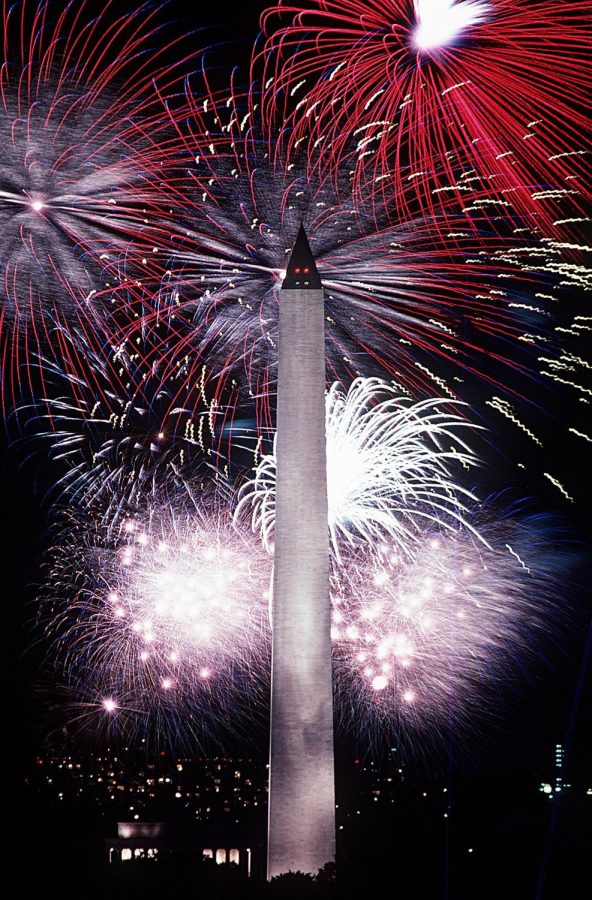American Exceptionalism: An Ideological Instrument
January 28, 2021
July, a month of long summer nights and escapes to the shore, is perhaps best characterized by its fourth day. Indeed, since its first commemoration in 1777, not one year has passed without recognition of the Fourth of July. Yet, beyond the echoes of distant fireworks and familiar scents of barbecues, lies an entrenched and unshakable patriotism. America embraces its past, clutching to it like a priceless artifact. But rather than storing it away behind a secure sheet of glass, our history has been utilized, as a kind of compass — a point of reference, for looking into the future. And for this, we thank the many individuals who first laid the groundwork for our nation. This, in essence, is American patriotism, a quality that manifests itself throughout our lives.
Take the Anthony Wayne Mural, located in the Wayne Post Office. Painted in 1941, courtesy of Alfred D. Crimi, the piece has long lasted as a token of pride. Five blocks down, we find a similar sentiment with the Bateman-Gallagher American Legion Post 688. It serves as “a patriotic veteran’s organization” by upholding “national security”. Other events, apart from the Fourth of July, also contribute to Radnor’s patriotism, such as Memorial Day. Often referred to as Decoration Day, the last Monday in May is reserved for remembering those who lost their lives in pursuit of defending the United States.
Though not entirely universal, a love for our country is quite widespread. Still, our great patriotism is not abnormal — America is not alone in flying a flag and honoring virtues. However, what does spark curiosity and, frankly, scrutiny, is when people take national pride another step further. There is a fine line between patriotism and rendering your country unparalleled. The latter ideology lies at the heart of American exceptionalism, a belief that our nation is intrinsically transcendent.
“’Exceptional’ is usually complimentary,” says Mr. Wright, a long time Radnor High School history teacher of government, American studies, American history, and geography. “But the compliment also indicates that there is something extra special or extraordinary. It tends to have a singularity about it.”
There is an underlying depth to this seemingly clear-cut concept. American exceptionalism is far more than a mere ideology. It is a tool, and quite a powerful one at that. By and large, there are two prominent avenues through which American exceptionalism is employed: in foreign policy and for domestic political benefit. The former is greatly reliant on an “otherness.” Distinguishing “them” from “us” will, inherently, place us on a pedestal. This sense of pride prompts “exceptionalists” to deem their objectives superior to others. They operate in such a way that turns their opinions into necessary decisive actions — for better or for worse.
In some regards, America is exceptional. To give you an idea, let us explore two related, yet distinct, instances of American exceptionalism. Madeline Albright and George W. Bush, both faced with the same foreign policy issue — how to respond to possible weapons of mass destruction in Iraq — used similar language but had differing mindsets. Albright, when questioned, described America as “the indispensable nation” and that we “stand tall and we see further than other countries into the future.” She offered the example of the Gulf War, 1990, when the United States assembled a coalition of 35 countries to expel Saddam Hussein from Kuwait. In 1998, the year of her interview, the threat of Saddam Hussein persisted, but Albright tempered her invocation of American exceptionalism by noting that the use of military force is never the final act in foreign policy. She explained how invading brings forth a new set of questions, as we become “an occupying force.” Thus, Albright recognized the limits and risks inherent in the use of military force and cautioned against it when one’s goals and subsequent steps are undefined.
The Bush administration, five years later, did precisely what Albright discouraged. Under the influence of Vice President Dick Cheney and Secretary of Defense Donald Rumsfeld, George W. Bush invaded Iraq and deposed Saddam Hussein. Bush, on the eve of the Iraq War, arrogated to his country the exceptional right to invade a nation that was not threatening to wage a war: “The United States of America,” he noted, “has the sovereign authority to use force in assuring its own national security.” While the invasion was a spectacular success, the occupation was an utter disaster. “It was basically a preemptive doctrine. It was ‘I think you are going to punch me, so I’m going to punch you first,’” explains Mr. Wright. For the following eight years, an Iraqi insurgency flooded the cities and put all American troops in peril. The resulting power vacuum also led to a civil war between conflicting religious groups. The United States even turned to torturing detainees in the Abu Graib prison.
This “argument of national security,” explains Mr. Wright, “is harder to make, the farther away from an incident or episode you get; but it did not stop them from making it.”
Ultimately, both Albright and Bush had considered America exceptional. Yet, Albright’s approach was based on a methodical assessment, while Bush ignored facts and was driven by “blithe assumptions, cultural ignorance, and careless planning”.
Government officials have recognized opportunity in the concept of American exceptionalism: in appealing to those who fancy America exceptional, politicians can strengthen their support. Donald Trump serves as almost a textbook example. On the 23rd of August 2020, the Trump Campaign released its Second Term Agenda entitled “Fighting For You!” It outlines what Americans should expect in the event of a Trump second term. A hue of exceptionalism underlies this “set of core priorities.” For instance, we learn of the President’s “boundless optimism and certainty in America’s greatness” and how he hopes to include American exceptionalism in educational curriculums.
The former President has also taken another stance when it comes to American exceptionalism. Trump has regularly noted that “making America great again” lies at the top of his administration’s itinerary. With this now ubiquitous slogan, he purports and rejects expression of American exceptionalism, asserting, in an interview with Jim “Mattress Mack” McIngval of Texas Patriots PAC, that “I [Trump] never liked the term [exceptionalism].” Yet, it was the statement that followed which unearthed his true intention: “I’d like to make us exceptional…. We may have a chance to say it [we are exceptional] in the not-too-distant future.” Trump is employing his supporters’ cry for pride as a campaign strategy. “That was very much a campaign gambit. He was going for something specific: ‘trust me and I will cater to and bolster America and what we all know that it is,’” says Mr. Wright. Indeed, to deny current excellence is to promise future excellence.
Trump is not the only official to have deployed American exceptionalism in his political endeavors. Ronald Reagan, our 40th President, had a similar strategy. Reagan’s election in 1980 was a time of great uncertainty. Tension and inflation were high, while national confidence was at an all-time low. Reagan, however, saw his country through a starkly different lens. As Annelise Anderson, Research Fellow Emerita at the Hoover Institution, explains, “Reagan’s view of American exceptionalism is often summarized in a phrase that turns up in many of his speeches — a ‘city on a hill’” (Anderson, 144). Reagan’s borrowing of a phrase from the Gospel of Matthew allows for a double appeal — to exceptionalists and to religious voters.

On the fourth page of the 2016 Republican Party Platform, the Preamble, the party “reaffirm[s] the” integral “principles” that define our country. The crowning convention is American exceptionalism, brought on by “our historic role — first as a refuge, then as a defender, and now as an exemplar of liberty for the world to see.” Our national pride is unequivocal; and though it can “unite us in a common purpose”, it is all too often a blinding force, capable of creating havoc.
What merits the term “exceptional” is subjective. America bears a distinguished reputation, but the notion that this somehow warrants anything more than measured pride is incorrect. Our history is not a signal of superiority, nor a totem of rectitude. It is a continuous reevaluation of our actions and their repercussions, positive and negative.







